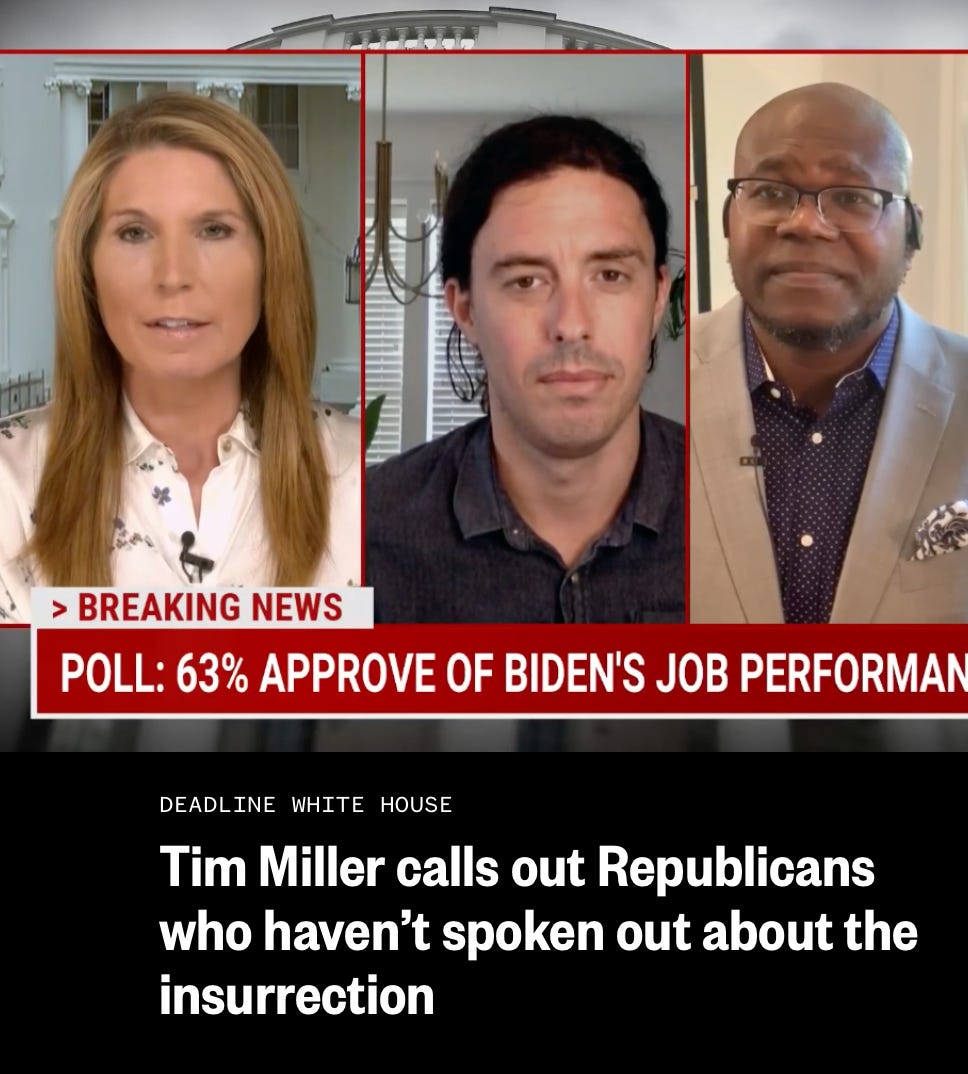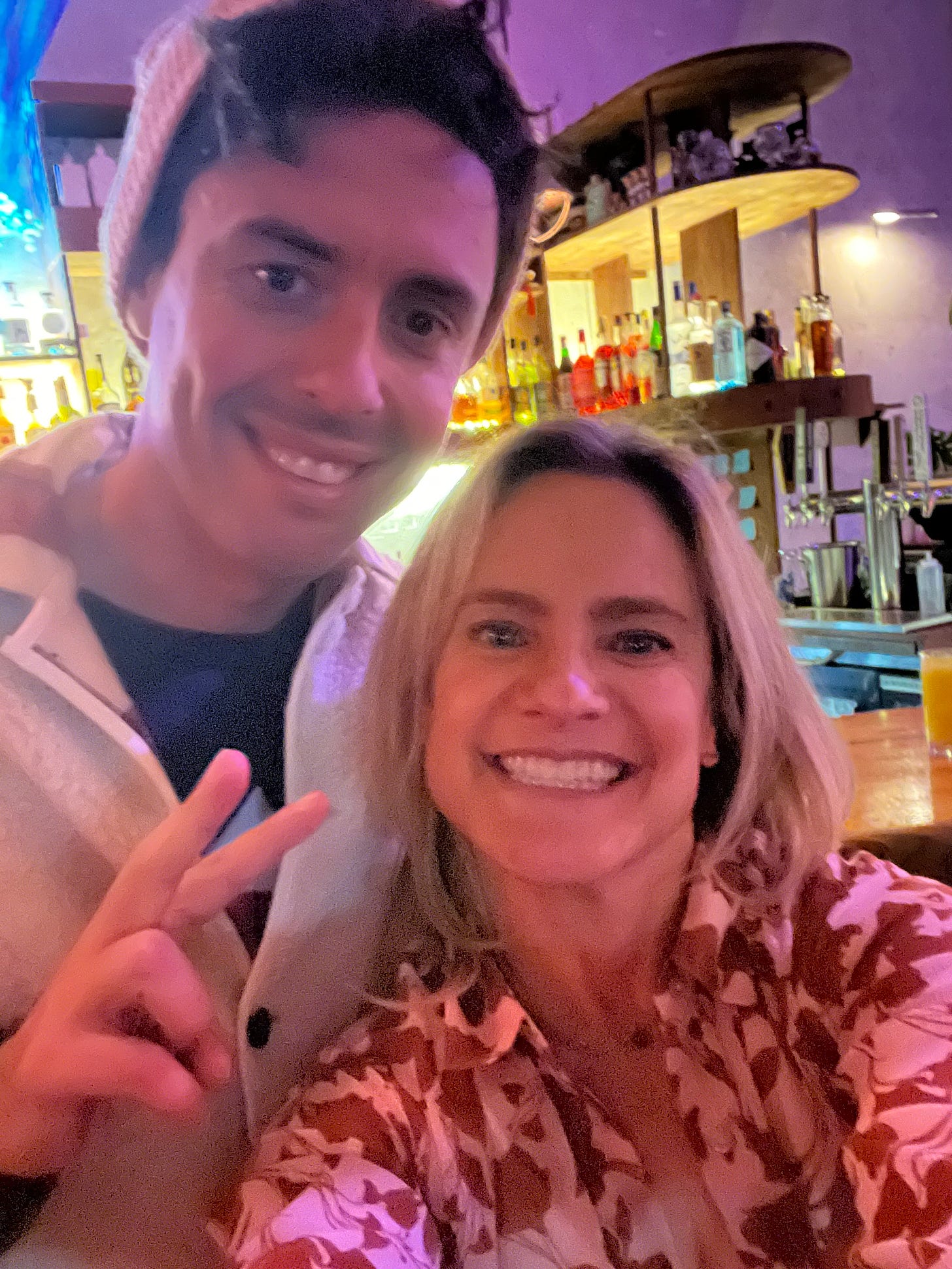From "Dick Pill Ads" to Over 20,000 Paying Subscribers: The Unexpected Rise of The Bulwark
Former Republican Tim Miller on How Connecting with Your Audience Changes Everything
Hey Everyone —
I nearly fell off my chair yesterday when I learned that readers of The Squeeze live in 47 states and 65 countries — holy far-flung podcasts! Of course, I realize that newsletters (and podcasts) are global, but it’s a different thing to see you all on a map —
Thank you for subscribing; I’m grateful for each and every one of you.
A couple of notes before we get to today’s main event —
I am tardy in recommending that you check out Pacific Content’s 2023 Industry Forecast, in which I, along with various podcast experts rant about share thoughtful predictions for what the next year of podcasting has in store for the world. I was feeling particularly grumpy about everything just before keying in my answers, as evidenced by the quote included in this otherwise delightful marketing graphic, which I was supposed to share on the socials:
My guess is that you don’t come to me for sugar-coated takes at this point, but my commentary here feels a bit extra. In any event, many of my fellow experts were far more cheery, so don’t let my gloom ruin your fun — check the whole thing out if you haven’t already.
On a separate note, I’m looking for people to interview for a story about podcast industry awards. Please hit reply on this email and let me know if you:
Have firsthand knowledge of the process behind any of the industry awards;
Are a podcaster who has a story to tell me about what it was like to apply for an award;
Have a strong point-of-view, based on personal experience, on any of the above.
Thanks!
Moving on to the main event —
From “Dick Pill Ads” to Over 20,000 Paying Subscribers: The Unexpected Rise of The Bulwark
In 2019 a friend suggested I check out The Bulwark, the flagship podcast of a conservative, but never-Trump news organization of the same name. I’m a liberal Democrat, but my friend thought I’d get a kick out of listening to former members of “the dark side” discuss how to save our democracy. She was right; not only was it a buzzy delight — and honestly, kind of a relief — to hear conservatives parse through Trump’s latest stupidity or strategize on how to get Biden elected, but there was something low-key subversive about it as well. It was almost as if I was eavesdropping on prisoners of war who had defected from enemy lines. (Politics makes strange bedfellows, as the saying goes.)
My favorite guest on the show was Tim Miller, a writer at The Bulwark and a former Republican operative (he was Jeb Bush’s communications director in 2016 and an aide to McCain during the 2008 presidential primaries). Tim immediately stood out for a number of reasons: he’s a millennial, he’s gay, and he’s abso-fucking-lutely hilarious. After discovering him on The Bulwark’s flagship podcast, I began listening to The Next Level, another Bulwark production that Tim co-hosts with two of his colleagues. There is almost always something for me to disagree with on these shows, but that is part of the point, and for me, part of the joy of living in a complex political world.
Over the past few years, The Bulwark has undergone significant growth. The burgeoning media company is now home to seven podcasts (eight if you include A French Village rewatch podcast that I enjoyed thoroughly), six newsletters, as well as a vibrant news website. In 2020 The Bulwark launched a premium service called Bulwark+, which now has over 20,000 paying subscribers, and a weekly livestream event, in which hundreds, if not thousands of members come to interact with staffers as well as each other.
In addition to (and perhaps as a result of) his work at The Bulwark, Tim has been successful in a number of other mediums: he’s published a New York Times bestselling book called Why We Did It: A Travelogue From the Republican Road to Hell (it’s a page-turner), launched Not My Party, a show on Snapchat that reaches 200,000 viewers each week, and inked a deal with MSNBC as a political commentator, among other things.
So yeah, Tim Miller is a busy man. Which is why I was shocked when he agreed to meet me for drinks a few weeks ago, to discuss the rise and growing influence of The Bulwark. With the benefit of hindsight however, I should have expected nothing less. Because it turns out that connecting with listeners — or in my case, a listener who happens to be a reporter — is not only par for the course for Tim, but a key element of The Bulwark’s winning strategy.
This has been edited for clarity and length.
Skye: Let’s start with your Bulwark origin story.
Tim: After Trump won, I had a midlife crisis. I was grasping around for what I should do with my life, in a literal sense. Should I leave politics altogether? Should I move my family to Mexico?
[Co-founder of The Bulwark and political strategist] Sarah Longwell and I had briefly been colleagues in D.C. She was one of two gay people I knew in town, so after I came out, we would hang in gay D.C. together — at 17th Street Pride events or whatever. Sometime in 2018, she told me that she and [co-founder of The Bulwark and conservative writer] Bill Kristol were going to try to make The Bulwark thing a thing. At that point, it had mainly been a news curation website. They couldn’t pay me anything, but I thought there was value in what they were trying to do, so I agreed to help out. At the time, I was thinking, I’m happy to do this for Sarah. None of us knew if people would even care about what we had to say.
Pretty early on that began to change. We started getting messages from friends and random people on social media saying “Hey, I love that thing you wrote for The Bulwark; we need more of that.” It became clear that what we were saying was resonating.
Skye: Who were you hearing from?
Tim: There were two main groups — first, Republicans who felt politically homeless. They had lost The Weekly Standard [a conservative news outlet that was shut down in late 2018] and for them, The Bulwark was as much of a place to read journalism as a place to convene. They just needed a place to go. Second, there were the liberals. They would say things like “my family has gone insane; I always disagreed with them, but we can't even talk anymore.” They thought listening to us might help them figure out how to convince their MAGA family members to see things differently.
Skye: What was the business model at that point?
Tim: The Bulwark had been set up as a nonprofit, but we started to talk about whether we could sustain it with the help of the community that we were building. There are a lot of nonprofit rules that we didn’t want to deal with anymore and there was also some amount of risk in being at the whim of donors. The Weekly Standard had been shut down because a rich MAGA donor was unhappy about the coverage. I don't think our Bulwark donors would have put the same kind of pressure on us, but you never know — rich people can get weird.
Skye: How did you decide?
Tim: We hashed it out in a conference room. People had concerns about how many people would actually pay, how much content should be placed behind a paywall, whether we should run ads, etc. We had tried advertising very early on, but at the time, we were too small to get ads for anything other than dick pills.
Skye: Excuse me?
Tim: Dick pills, literally. I think [The Bulwark host] Charlie [Sykes] had to read erectile dysfunction ads for a full day. Charlie was like, I’m not doing this. But by the time we were in the conference room, our advertising prospects had changed. And ultimately, none of us wanted to live through the The Weekly Standard situation, so we decided to take a risk and try doing subscriptions and advertising. It’s worked, which is amazing.
Skye: I’ve wondered whether The Bulwark’s success is related to something you alluded to earlier — that it was a place for people convene, a place for people to come together.
Tim: We’ve put a lot of effort into building a community around The Bulwark. Even before we launched subscriptions, we always made an effort to get back to people who emailed us or tweeted at us. People could tell that we actually wanted to engage and I think that set us apart. Generally, most people don’t have personal relationships with political reporters! But we’re different.
Originally, we had planned to get the community together in real life, but then the pandemic hit, so we started doing these Thursday night livestreams. When we did the first one, we were honestly kind of taken aback by how vibrant the comment section was during those events. And people were from all over the place — “Hi, I’m from Toledo,” “I’m from Montreal,” “I’m from Dallas.” It was clear that people wanted to interact with us but they were also enjoying interacting with each other.
Skye: So you’ve worked hard to foster a community, but subscribers also have to be drawn to you as people. Do you think there’s something unique about how you present yourselves to your audience?
Tim: We’re all outcasts, which means that we’re free to say whatever we think. No shade whatsoever to my friends who write for The Washington Post or the New York Times, but readers don’t really know those reporters. Most of them have to write in a certain way, and even when they’re on podcasts, they have to be careful with what they say or how they frame things, and for good reason! But we’re able to say what we really think, and sound like ourselves and I think that makes our relationship to the audience much stickier. We can have real personalities and people connect with that. I think it helps with the growth of our podcasts and everything else we produce.
Skye: Do you think you’re changing peoples’ minds? How influential do you think The Bulwark is at this stage?
Tim: I think we’ve built a permission structure for more traditional Republicans to vote for certain Democrats because the alternatives are so bad. People who might be on the fence about voting for certain candidates — who aren’t sure if they can get there on someone like Fetterman or Warnock, for example — I think we help make that decision easier.
In terms of broader influence, we get quoted by mainstream media and cable TV quite a lot now. The ‘media elite’ are paying attention to us, I guess. Actually, the other day, a White House reporter told me that the administration might as well have a How We Did It book club because all of his sources were urging him to read it.
Skye: Wow, that’s amazing. You’ve also been proactive in trying to reach new audiences with your Snapchat show, right?
Tim: I set it up with the idea that I really wanted to reach a younger demographic. I started Not My Party in September of 2020 and now it reaches about 200,000 people every week. About 170,000 are males between the ages of 13 and 24 and 10,000 are females in that same age group. They’re mostly college kids who are trying to figure out what their politics are. They want to learn, they want to connect with politics in some way. I see myself in these kids.
Skye: You’re about to go on a west coast live show tour. Are those events also about building a bond with your audience?
Tim: Yes, but events are a legitimate growth strategy for us, too. I think bringing a friend to a live event is a great way to get someone engaged with what we’re doing. You can tell a person, “you should really listen to this podcast!” and they’ll turn it on for two minutes. If those two minutes don’t resonate they’ll never listen again. But if you bring them to an event, it’s a whole different thing and hopefully it engages them even more so that they want to listen after they get home. That said, events are hard.
Skye: Why?
Tim: They’re expensive. It’s like ten thousand dollars to rent a place and then we have to fly everyone out there. Right now, we’re basically breaking even on events. But we’d like to do more of them.
Skye: Let’s talk about money. You have over 20,000 paying subscribers. What does that actually mean for you financially?
Tim: It means that none of us are building yachts, but everybody’s fine. You can do the math — it’s a hundred bucks a pop. That’s over two million dollars, which sounds like a lot, but it’s spread across 15 people. So nobody is getting rich off this, but we've created a small, stable media company that can sustain itself, while other media companies are shutting down all the time.
Where I think we’re really fortunate, is that people become members because they want to support us. They’re not in the mindset of “I'm paying you for this newsletter.” That’s why we actually don’t have that much stuff behind the paywall; it’s not that kind of product.
Skye: Which products perform the best?
Tim: Our best performers are the daily products. The Bulwark podcast is crushing it — it’s always in the top 20 or 30 news podcasts in the country. [Ed. Note: The last time I checked The Bulwark was #31 in news and #5 in politics on Apple Podcasts.] The morning newsletter also does really well. I think a daily podcast or newsletter becomes part of the rhythm of someone’s day. On the other hand, the weekly show I host with Sarah and [Bulwark editor] Jonathan V. Last, The Next Level, is doing fine, but the growth is slow. You would think that the audience I have on the Friday episodes of The Bulwark would port over to The Next Level, but that hasn’t happened yet. The Next Level still has a significantly lower audience numbers.
Charlie had a podcast at The Weekly Standard, so he had a base of people who followed him over to The Bulwark from there, but all of our other podcasts have had to start from scratch. Getting from zero to one is a big obstacle. That’s the part that sucks, right? You can have a great idea, but there’s no quick advertising fix to growing your audience.
Skye: You’re a natural on podcasts — have you ever been nervous?
Tim: No, not at all. Sarah was nervous, though. My advice to her was to get out of PR brain.
Skye: What is PR brain?
Tim: It’s the idea that you have talking points, and you need to stick with them. Podcast success is about being natural, being authentic, giving real fucks. If you're cautious, it’s not going to be a good podcast. You have to be free, you have to take risks — and just understand that being free sometimes means you might say something a little out of turn. It’s way less stressful to me than being on TV.
Skye: Why?
Tim: On TV you have to worry about time constraints, and whether it’s that other person’s turn to speak. And you can get in your head about how you look. On a podcast, I just get my point across and it doesn't matter how I look and I like the freedom of that.
Skye: Given the tenor of the country right now, do you ever worry about getting harassed by people?
Tim: In 2016, I was doing a bunch of anti-Trump TV. This was before I joined The Bulwark. Fox had a segment where they would have me and some awful MAGA Republican debate each other. You would not believe the threats I got from crazy lunatics. At the time, I was the only Republican guy on TV who didn’t like Trump! I was a fresh traitor, but I’m not fresh anymore; they’ve moved on to newer, fresher traitors.
Skye: I just want you to stay alive.
Tim: When I was in the closet, I did so much lying in my private and professional life. And I did a lot of worrying about what people would think — but I'm done with lying! I’ve moved on from all that. I’m very lucky to be in a position where I can say whatever the fuck I want and get rewarded for it.
Skye: How does that feel?
Tim: Fucking amazing!
That’s it for me this week! Have a great weekend —
Skye
Post Script: Yes, I made him take a selfie with me!












Great piece! Love him and the whole Bulwark crew.
I have been a HUGE fan of Tim and The Bulwark for quite a while now. They have kept me sane. Thank you for your interview, Skye!